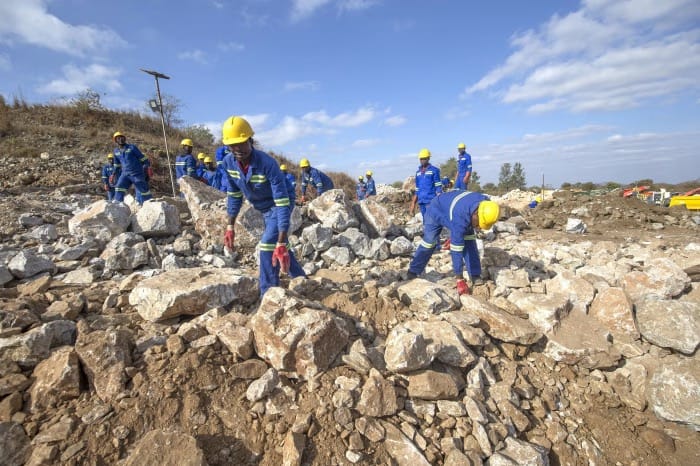July 9 2025
Trump Turns on Putin; US Munitions; Bondi Faces MAGA Backlash; Trump Pushes Tariff Deadline; US Meets African Resistance on Critical Minerals

"A Lot of Bullshit": Trump's Harsh Turn on Putin as U.S. Arms Flow Again to Ukraine
How U.S. Munitions for Ukraine Were Halted in Poland as Pentagon Worried Over Stockpile Levels
Bondi Faces MAGA Backlash After Failing to Deliver Promised Epstein Files
At Bessent's Urging, Trump Pushes Tariff Deadline to Pursue Trade Deals
"Resource Nationalism": U.S. Push for Critical Minerals Meets African Resistance to Raw Ore Deals
Newsletter sponsor

1. "A Lot Of Bullshit": Trump's Harsh Turn On Putin As U.S. Arms Flow Again To Ukraine
President Trump on Tuesday unleashed weeks of frustration with President Vladimir V. Putin of Russia over what he described as “meaningless” gestures toward peace, a day after Mr. Trump said the United States would resume sending munitions to help Ukraine fend off Russia’s multiyear invasion. The remarks from Mr. Trump were his harshest toward Mr. Putin since he was first elected president in 2016, and came as an abrupt change in public posture toward the Russian leader after months of failing to forge peace in a conflict he once boasted he could resolve in a day. “We get a lot of bullshit thrown at us by Putin, if you want to know the truth,” Mr. Trump told reporters during a cabinet meeting at the White House. “He’s very nice to us all the time, but it turns out to be meaningless.”
NYT
2. How U.S. Munitions For Ukraine Were Halted In Poland As Pentagon Worried Over Stockpile Levels
As Mr. Trump’s disillusionment with the Russian leader was building, Pentagon officials were growing increasingly concerned about the potential depletion of the American stockpile of weapons, especially after Israel attacked Iran.Officials in Washington were worried that American bases in the region could be targeted, especially if the United States joined Israel in striking Iran’s nuclear sites. That would require more arms to defend American troops. The Pentagon also rushed additional Patriot antimissile batteries from South Korea to the Gulf region as military planners projected how many Patriot interceptors and other munitions American forces might need in a protracted conflict. Mr. Trump had asked the military for an inventory of available munitions around the time of the U.S. strikes on three Iranian nuclear facilities, according to two people briefed on the matter, who spoke on the condition of anonymity to describe internal decision-making. Senior Defense Department leaders then decided last month to pause delivery of some air defense interceptors and precision-guided bombs and missiles to Ukraine, citing concerns that the U.S. weapons stocks were running low. Some munitions and weapons are drawn from existing Pentagon stockpiles, with Congress reimbursing the Defense Department to quickly replenish those inventories, often with updated weapons and munitions. The second stream comes from the Ukraine Security Assistance Initiative, in which the Pentagon finances the acquisition of weapons for Ukraine directly from American military contractors. The firms deliver the munitions to Ukraine over a period of months or years. Most of the weapons sent from Pentagon stockpiles have been delivered, with the last slated to be sent later this summer. The contracted munitions are expected to continue to flow into next year. The interceptors were especially prized because they are one of the few weapons Ukraine can use to knock down Russia’s most advanced missiles. They have been critical weapons in Ukraine’s struggling efforts to hold off increasingly intense attacks from Russia, at a particularly perilous moment in the three years and four months since Russia invaded. The initial tranche of paused weapons — a mix from Pentagon inventories and new factory delivers — was held up in Poland last month just before it was to be loaded onto trucks and sent into Ukraine, two military officials said. That shipment was still on hold as of Tuesday afternoon, the officials added. That shipment was relatively small, to include 30 Patriot interceptors, 142 Hellfire missiles for American-made Ukrainian F-16 fighters and nearly 8,500 155-millimeter artillery shells (equivalent to about what Ukraine fires in two days along its front lines). But as one former Ukrainian official put it, in the current security environment, “even 30 Patriot missiles is a big deal.” And Ukrainian officials feared subsequent weapons shipments would be paused or eventually canceled. But the decision caught other parts of the government, including the State Department and Congress, by surprise, and drew immediate criticism from supporters of Ukraine.
Editors note: no one is asking the key question - how fast can the US manufacture Patriot interceptors??
July 7 2025
Landmark Bill Signed; Flood Death Toll Reaches 82; Retailers Battle; South American Oil; US Missile Stockpiles Low

NYT
3. Bondi Faces MAGA Backlash After Failing To Deliver Promised Epstein Files
Pam Bondi’s tendency to exaggerate is catching up to her. Right-wing influencers and allies of President Trump are calling for the attorney general’s resignation after she backtracked on a promise to release what she once called a “truckload” of documents from the Federal Bureau of Investigation’s investigation into convicted sex offender Jeffrey Epstein. Bondi also previously implied that she had a list of Epstein’s clients sitting on her desk waiting for her review. The Justice Department on Monday denied the existence of such a list and said it would make no further disclosures about the case. The about-face drew a chorus of criticism from right-wing figures, including Glenn Beck, Benny Johnson and Jack Posobiec. Laura Loomer asked late Monday on X, “How many more times is this woman going to get away with Fing (sic) everything up before she is FIRED?”
Editors note: the official editorial position of citizen journal is that Epstein did not kill himself
WSJ
4. At Bessent's Urging, Trump Pushes Tariff Deadline To Pursue Trade Deals
WASHINGTON—President Trump decided to delay the implementation of his so-called reciprocal tariffs to Aug. 1 after advisers including Treasury Secretary Scott Bessent told him he could get trade deals with more time, according to people familiar with the matter. Administration officials including Bessent felt as if they were making progress on deals with several trading partners such as India and the European Union as Trump’s previous deadline approached, the people said. An initial pause on the reciprocal tariffs was set to lapse at 12:01 a.m. Wednesday until Trump on Monday further postponed the implementation date for three weeks and sent out letters warning countries of the rates they would face on that day. The weekend before his Monday announcement, Trump deliberated in phone calls and private conversations with allies from his private golf club in Bedminster, N.J., according to people familiar with the outreach. Trump was weighing whether he should give a new August deadline or send out letters without a date and simply a declaration of new tariff rates, the people said.
WSJ
5. "Resource Nationalism": U.S. Push For Critical Minerals Meets African Resistance To Raw Ore Deals
KAMPALA, Uganda—Trump administration officials seeking deals for critical minerals in Africa are in for a surprise: Governments here are increasingly reluctant to export raw ore, betting instead they’ll keep more jobs and revenue if they insist on processing the material at home. Nearly half of Africa’s 54 countries—from Angola to Zimbabwe—have restricted or banned raw-material exports over the past two years, according to the Organization for Economic Cooperation and Development. Zimbabwe, Africa’s top producer of lithium, a key electric-vehicle battery component, says it plans to ban exports of the raw mineral in 2027. Already its government has been pressuring mining companies to build processing plants there, creating 5,000 new jobs and increasing export earnings from the mineral to $600 million in 2023, from $70 million in 2022, according to the mines ministry. “More and more African countries are keen to secure the benefits of the global demand for critical raw materials,” said Thomas Reilly, a former British diplomat now a senior adviser with the Washington-based law firm Covington & Burling. “Resource nationalism, if done right, will help these countries to move up the value chain, creating jobs, attracting more international investment and developing local economies.”
WSJ
July 9, 1877: Wimbledon tournament begins

Sign up for local news delivered to your inbox in:
Many more cities coming soon!
See the citizen journal Podcast! Released on Apple, Spotify and YouTube around 10a CST.
Sponsors (click me!)





SUBSCRIBE TO GET THE CITIZEN JOURNAL IN YOUR INBOX - FREE!
subscribe/unsubscribe to city emails, subscribe to app notifications, get the app
Sources
- https://www.nytimes.com/2025/07/08/us/politics/trump-putin-ukraine.html
- https://www.nytimes.com/2025/07/08/us/politics/trump-putin-ukraine.html
- https://www.wsj.com/politics/policy/pam-bondi-epstein-files-maga-40383ad4?mod=hp_lead_pos6
- https://www.wsj.com/economy/trade/trump-tariffs-scott-bessent-trade-deals-cc76e43a?mod=hp_lead_pos1
- https://www.wsj.com/world/africa/africa-wants-its-critical-minerals-to-yield-jobs-not-just-dollars-850963e3?mod=hp_lead_pos11
Contact: greg@loql.ai


